
During a conversation with the main partner of a 20-employee small business, we discussed three main problems stopping their business from growing:
- Lack of brand awareness makes it hard to reach potential customers.
- Relying heavily on referrals or word of mouth for new leads.
- Never knowing when their next customer will come and where from.
To solve these problems, the small business needed to invest in marketing to attract valuable customers. Pay Per Click (PPC) is one of the best ways to do this because it helps:
- Find potential customers looking for your offer today.
- Generates a predictable flow of new customers.
- Ensures affordability if you use the right strategies (read below).
Using our PPC strategies with 200+ businesses, we’ve generated 1000s of new customers for our clients. Read this article to learn how to find new and valuable customers through PPC, and book a call if you’d like an honest digital marketing agency to run your PPC campaign for you.
How much profit can PPC make your small business?
It’s very likely one of your competitors is growing rapidly due to a well-executed PPC strategy.

But every small business is different. Your company will have different positioning, brand awareness, service offering, and costs compared to a local competitor. That is why you need to have a strategy that is suitable for your small business offering.
Therefore, before you read our winning strategy, it is essential that with our interactive calculator, you should first work out if PPC will be a profitable method to acquire new clients.
But first, read these three definitions to understand how the calculator works!
How PPC Works
When you run a PPC campaign, you will pay to appear on a search engine every time a potential customer searches a specific keyword (which we will define later). Every time a potential customer clicks on your ad, you will pay money to the ad platform. This is called the Cost Per Click (CPC). For the industry, CPCs typically range from $0.50 and $5.
|
Cost Per Click (CPC) Cost per click is the amount of money you pay to an advertising platform, like Google, to have a user click on your ad. |
Of the people who click on your ad, some will convert into becoming a customer. This is your Conversion Rate (CVR). For the industry, CVR typically range from 3% and 8%.
|
Conversion Rate (CVR) Conversion rate is the percentage of users that convert into becoming a customer after clicking your ad. |
We can use this to determine the cost of acquiring a single customer. Typically, this is called the Customer Acquisition Cost (CAC). For the industry, CACs typically range from $0.62 and $1.60.
|
Customer Acquisition Cost (CAC) This is the cost of acquiring a single customer or client. Customer Acquisition Cost = Cost Per Click / Conversion Rate CAC = CPC / CVR |
Interactive PPC Profit Calculator
Use this interactive calculator to work out how much profit you will receive from each customer acquired through PPC.
We’ve built this calculator using typical CPC and CVR across the startup industry. All you need to do is enter the amount of revenue a single client generates for you. The calculator then subtracts the marketing costs from the revenue to give you a profit per customer. Hence, by using this calculator, you can develop an understanding of the potential profits PPC could generate for your business.
It is important to note that PPC is not 100% predictable, so we have created three unique cases which represent how well your PPC campaign could perform.
Enter how much a single client
generates you in revenue
| best | average | worst | |
|---|---|---|---|
| CPC | |||
| CVR | |||
| CAC | |||
| Profit |
Visualise how much profit you could make with PPC
Overview of our PPC strategy
There are three steps to running a profitable PPC strategy.
- Set up PPC campaigns correctly to target the right audience and keywords.
- Design high-converting landing pages. These are the pages that your potential customers will visit.
- Optimise your ads and landing pages to get the maximum profit.
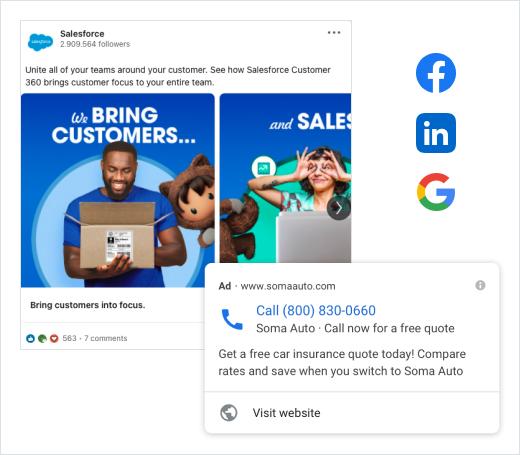
Paid Search + Paid Social
We create and manage ad campaigns on all search and social platforms.
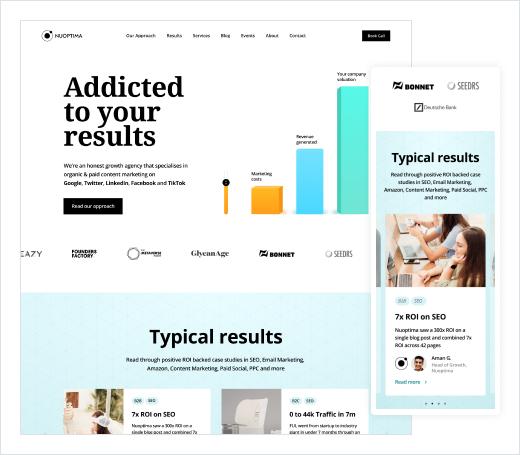
Landing Page Design
We design and implement landing pages that are made to convert.
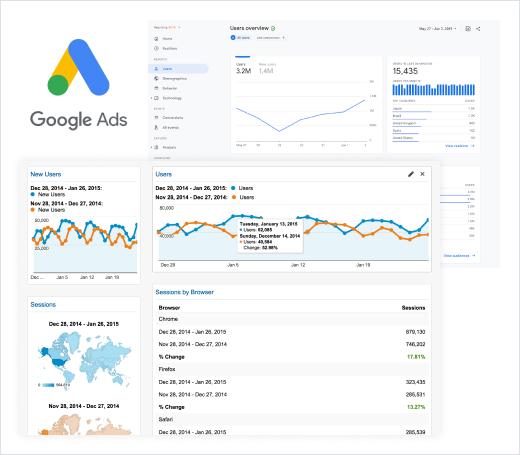
Conversion Optimization
We perform ongoing analysis and experimentation to optimize performance.
Without experience, a lot can go wrong. Doing even one of the steps incorrectly can result in losing money for every single customer you acquire.
That’s because choosing the wrong keywords can result in you paying a massive $200 per click, not a mere $20. It can result in your page converting at a lowly 2%, not an optimised 20%. It’s the difference between you paying $100 for every new customer or an unprofitable $10,000.
To not lose money and grow your business profitably, it is important to get each step right. The rest of the article will shed light on how to achieve a profitable PPC campaign.
Should you run ads on paid search or paid social?
There are two ways to advertise your small business online:
- Paid Search (Google Ads, Bing Ads)
- Paid Social (Facebook, TikTok, Instagram, Snapchat)
What’s the difference? Paid Search is when your ad appears on a search engine, like Google, after you’ve searched a term. This is a powerful advertising method because you can choose what keywords your small business appears for.
We know which keywords potential customers use when they’re looking for your offer, so we can specifically choose to show your business at the top of Google for those keywords. But because of this amazing feature, your competitors will try a similar strategy and make it expensive. You’ll need to optimise all parts of your PPC strategy to ensure costs don’t spiral upwards!
On the other hand, if you use Paid Social, you appear ‘in-feed’. When someone is scrolling on a platform like Facebook or Instagram, ads appear. These ads interrupt the scrolling process. The person scrolling has not said they’re interested in your product or service, but you’re hoping your ad will attract a customer. The disadvantage of this technique is your ad is also shown to people who don’t need your services. On the other hand, this advertising method is cheaper.
For small businesses in the B2B industry, we’ve mostly seen more profit on Paid Search, but there are some cases when Paid Social can work very well. On the other hand, those in the B2C industry might see more profit on Paid Social. Likewise though, there is definitely the ability to make a profit through Paid Search too.
Hence, it’s not completely black and white which way of advertising will work best for your business. It depends on the following:
- What exact product or service are you selling?
- Who are your target customers?
- Where do your customers spend their time online?
- How much money do you make per customer?
We’re going to discuss Paid Search in this article as it is the most profitable PPC strategy when starting off. Also, sometimes a hybrid strategy using Paid Social can improve effectiveness — if this is something you’d like to discuss, you can book a call.
Running PPC paid search ads
The most common paid search ads are keyword based. When a keyword is searched, ads appear at the top of Google.
For example, here’s a generic keyword ‘Builders in Nottingham.’ Notice how the PPC ads appear first, and then the organic results (from SEO) appear second.
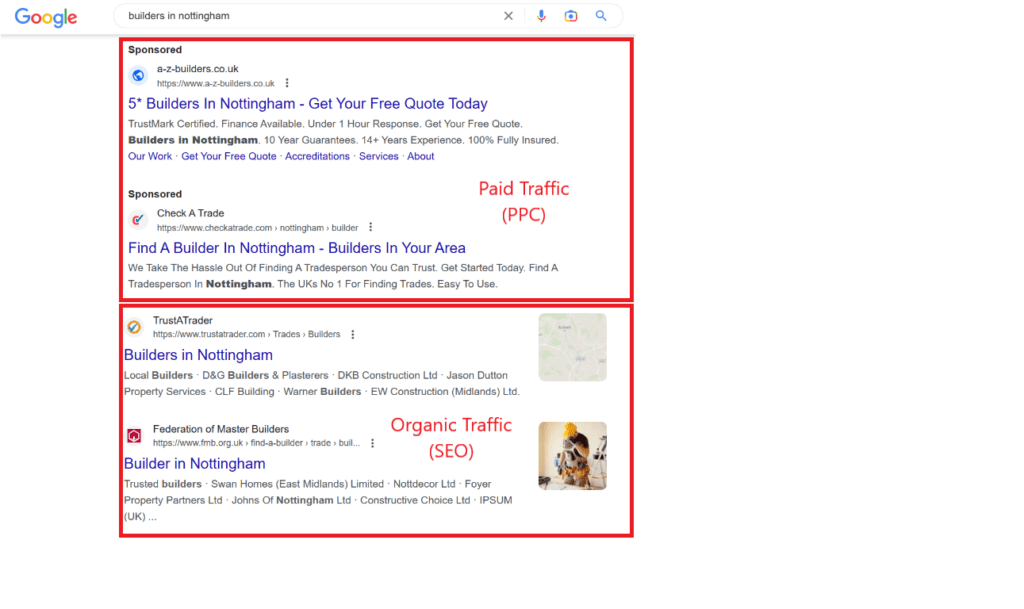
By paying for this ad, you can appear above SEO results (which takes longer to achieve). But, there are some pros and cons to this.
Pros of PPC:
- You can get in front of your potential customers quickly.
- You can win valuable buyers.
- You can test which keywords bring in qualified customers.
Cons of PPC:
- It can be expensive if you don’t set it up right.
- Most people scroll straight past your ads. They prefer to look at SEO/organic results (however, we can help you counter this by running a hybrid strategy so you appear for both).
Up till now, you’ve learnt and understood:
- How PPC works
- If PPC will generate profitable customers
- What paid search is
- The pros and cons of a PPC strategy
But we mentioned that PPC could sometimes be expensive if you go for the wrong keyword. How do you know which keywords will make you money? Let’s explore this further.
Which PPC keywords should you target to get new clients?
Most inexperienced PPC managers will make the mistake of choosing the wrong keywords. That mistake alone can be the difference between swimming in 100 new shoppers or drowning in $1000s of debt.
Here’s what wrong keywords look like:
Firstly, the wrong keywords are based exactly on the service you offer. Initially, it may seem perfect, but it can have an adverse impact.
Let’s take the example of the keyword, ‘Landscaping’. There are many competitors bidding for the exact keyword. This means the CPC is higher than is profitable for you to pay for, and results in you losing money. Remember, PPC operates on an auction-based bidding model. That means the more competitors that want to appear for the keyword, the more you pay.
Secondly, the wrong keywords have low intent.
For example, ‘what is landscaping?. The person Googling that keyword is not ready to instruct a professional landscaper to carry out a service. They’re in education mode. Typically, these keywords have a very low CPC because no one wants that traffic.
But what do the right keywords look like?
Firstly, the right keywords that have a high intent to purchase services and receive a quote. For example, these could be branded, product, or pain point keywords.
Secondly, the right keywords have reasonable CPCs, which make sense for the services you sell. You can look back at our interactive calculator to figure that out.
We’re going to show you all the types of keywords that can result in a lot of profit for your small business.
| Type of keyword | Examples of keyword | Pros | Cons |
| Branded | Pimlico Plumbers Alternative Holland & Barrett Comparison Products |
Cost-effective strategy to win new clients when your competitors may not be the best servicer. | The competition usually bids on their own branded keyword to protect against it. |
| Product and/or Service | Family-Owned Accountants Mobile Pet Grooming Handmade Gifts for Children |
High intent keywords for purchase or solving pain point and can be very profitable. | Service-level keywords are usually competitive, and services need bespoke landing pages. |
| Location | London Plumber Landscaper near me Photographers in New York |
High intent and very cost-effective. The big competitors usually avoid these keywords. |
You’ll be competing with local providers. You’ll need to be locally present or have easy ‘contact us’ information. |
| Pain point | How to make a small garden look bigger? What should I buy for someone who has everything? How to plan an event with short notice? |
It is possible to capture this lead before they go to competitors. You’ll be able to close this client without competition. |
Slightly lower buying intent as the user is in education mode. Will need a well-designed landing page. |
Excellent PPC ad creative and copywriting examples
Your ads appear next to your competitors, so you have to find a way to stand out. That is why we first analyse the competitive landscape before bidding on a keyword for a client.
Here are some examples of PPC ads and what we think of them.
Ad 1: Pimlico Plumbers appearing for ‘Plumbers in London’
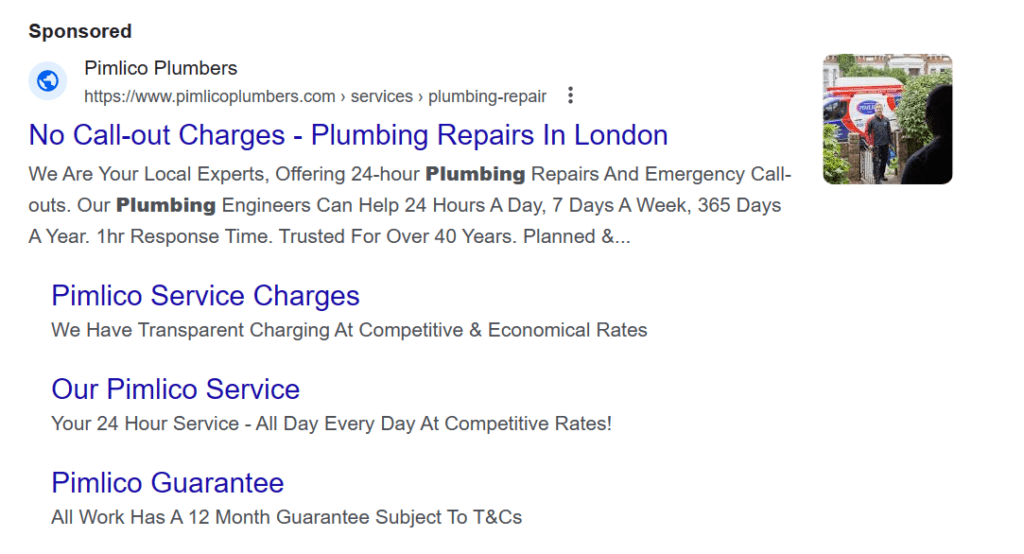
Keyword: ‘Plumbers in London’
Verdict: 5/5
Good areas: Excellent headline. It uses a variation of the keyword and highlights an enticing feature, ‘No Call-Out Charges.’ The description emphasises their experience and service benefits.
Bad areas: The ad may benefit from a clearer CTA.
Ad 2: Booking.com appearing for ‘Bed and Breakfast Edinburgh’

Keyword: ‘Bed and Breakfast Edinburgh’
Verdict: 5/5
Good areas: Great headline, displaying the keyword. The description highlights benefits such as the compelling ‘No Booking Fees.’ It also features some excellent CTAs.
Bad areas: The ad could include some social proof, such as press mentions.
Ad 3: Charles Stanley appearing for ‘Financial Consulting’

Keyword: ‘Financial Consulting’
Verdict: ⅘
Good areas: The headline includes an enticing ‘Free’ consultation to encourage clicks. The description also emphasises USPs, such as ‘local’ experts
Bad areas: Would prefer to see some social proof, such as 5-star reviews.
Ad 4: The Bristol Wedding Film Co appearing for ‘Bristol Wedding Videographer’

Keyword: ‘Bristol Wedding Videographer’
Verdict: ⅘
Good areas: The headline is relevant to the search query and targets localised searches. Price inclusion will help to qualify the leads to clients with the appropriate budget. There are also good CTAs.
Bad areas: Inconsistent punctuation. Also, the headline could be more engaging and less wordy.
How to create a high-converting landing page for small business PPC?
A high-converting landing page is one of the biggest factors in PPC success. Without it, you’ll be paying for traffic that doesn’t convert into customers. That’s a huge waste of cash!
We recommend you have a conversion rate expert build out your landing page. Our winning landing page framework is reserved for our clients, but we’ll reveal the most important sections you need.
Hero Block
The first section of the landing page is called the ‘Hero Block’. You can see the whole section as soon as you open the web page. You need to have three things in this section:
- Great headline. For example, ‘Best Photographers in Dallas’
- Social proof. For example, 5.8/5 stars, 500+ reviews
- Call to action. For example, ‘Try For Free for 30 Days!’
Your hero block needs to simply call out exactly what you offer, who it is for, and why you are a low-risk solution.
Service or Product Block
High up the page, probably in the 2nd or 3rd block, you will need to explain your services and/or products. You should explain its features and benefits. For example, if you provide local dog grooming services, you would have features and benefits as follows:
Features:
- Mobile grooming for all dog breeds
- We provide safe equipment to industry standard
- Grooming in the comfort of your home
Benefits:
- Peace of mind for owners with larger breeds
- You don’t have to travel with your dog
- Stress-free environment for pets
Call to Action Block
Every PPC landing page needs a highly compelling call to action block. It is solely designed to get the user to book an appointment or purchase your product.
We highly suggest including several call-to-action blocks throughout your landing page, such as at the top of your page, one in the middle of your page, and one at the end. You’ll be surprised how much it can increase your conversion rates and reduce your customer acquisition costs!
We include 6+ other high-converting blocks in our landing pages. Reach out to learn what they are and how to implement them.
Engage an agency to run your PPC ads
There are lots of aspects to running a profitable PPC campaign for your small business. You can attempt it yourself, or you can engage us, NUOPTIMA. We’ve worked with 200+ businesses and run thousands of PPC campaigns profitably.
A bit about us
We’re an honest growth agency, and our goal is to drive profit for your business.
We don’t work with everyone. In fact, we actively refuse 50% of all businesses that try to work with us. That’s purely based on if we think we can make your campaign a success. We only grow as an agency if we can get you results and you refer us to your friends and family.
Before you choose a PPC agency, reach out to our team. We’ll objectively tell you what we think, and if it’s good, we’ll propose a fair price alongside a set of growth expectations and Key Performance Indicators (KPIs).
Once you start to work with us, you’ll be in regular contact with our team. You’ll be provided with extensive data tracking and will communicate with us on regular calls.
Our PPC capabilities:
- We can service budgets from $100+ ad spend per day.
- Management costs start from $1,000 per month, depending on ad spend, platform, and requirements.
- Work on all ad platforms: Google, Facebook, Tiktok, Snapchat, and Reddit.
- We’ve worked with local service providers to public companies.
- We’ve worked across B2C and B2B, having driven brands to 7 figures in sales, and exceeded B2B SQL quotas.
Next steps:
- Firstly, you should visit our PPC services page here.
- Then, you should read through some case studies here.
- And when you’re ready, send us a message or book a call here.
FAQ
Pay Per Click (PPC) advertising can be a great way for small businesses to boost brand awareness and get in front of top competitors. However, you must use the right strategies to ensure affordability, and thus, profitability.
Compared to PPC, Search Engine Optimisation (SEO) is a great way to improve your website credibility overtime. However, as a small business it is incredibly hard to get noticed with SEO. Especially when you’re competing with established industry giants. This is where PPC may have the advantage for startups and smaller businesses because it positions you right at the top of the search engine results page.
PPC for small businesses is a quick way to generate quality leads and appear above the competition. However, it has it downsides. For instance, many people scroll past sponsard results for organic (SEO) results. In addition, if you use the wrong strategies it becomes costly.


